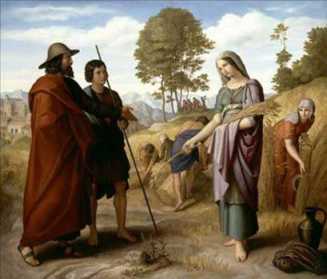Ruth of Moab - the Foreigner
Unconditional Love

Moab's sweet Ruth is loveliest
Amongst the women guilds,
Of Scripture, - Ruth, so highly blessed,
gleaned in the barley fields.
Self-sacrificing, faithful she,
whose beauty was so great,
Worked gleaning barley busily
in the garb of servant clad.
Ruth’ tender love did penetrate
the stiff barriers of race,
And overthrew this grievous state
with her devotion’s grace.
The loveliest of woman Ruth
of the Old Testament,
A widow in still blooming youth,
so fair, but indigent.
She left her home, left friends and kin,
and all she held most dear,
To comfort old Noami and
then breached a race a barrier.
Noami longed for a return
to the country of her birth,
And longed her saddening past to burn
and kiss Judean earth.
Ruth’ love of husband did regress
upon his aging mom.
It cradled her with tenderness
while seeking a new home.
The Moabitish damsel soon
became a shining light.
In Israel, that praised henceforth
her virtue Moabite.
No daughter-in-law ever was,
as Ruth, the Moabitess,
In-law-a-daughter only, but
so self oblivious;
Ruth did stay on with loyalty,
while Orpah took her leave,
Turned back to Moab, - while Ruth stayed
to share Noami’s grief.

Lo! mothers-in-law seldom find
too much of daughter love,
But Ruth embraced her husband's mom
With love all unheard of;
Both wandered across rough terrain,
protected by the Lord,
To reach Noami’s Bethlehem
with Ruth as sole support.
She kissed her mother-in-law’s bruise
and bandaged it with care,
And improvised a sheltering booth
and coverlets for her.
Both reached the Holy Land and then,
Ruth trusting and serene,
Worked hard and labored, stooped and bent,
in barley fields to glean.

She gleaned, and picked up barley stalks,
their daily bread to win,
In scorching sun, in wearying walks,
that tanned her jasmine skin.
Orpah retraced her steps back home,
but Ruth stayed on and clung,
And generations later bards
composed this lofty song:

“Entreat me not to leave Thee,
or to return from following after Thee,-
For whither Thou goest there I will go,
And where though lodgest, there I will lodge:
Thy people shall be my people,
And Thy God my God :
Where thou diest, will I die,
and there will I be buried”
(Ruth 1:16)
The land's lord, - Boaz,-saw her glean,
and in great wonderment,
Found out the gleaner was his kin,
returned to Noamis’s land;
The lovely Ruth of pagan land
Left all behind, her land and sod,
To ennter a new Covenant
With Noami's and now her God

And Boaz, the proprietor
took notice of his kin,
And marveled at her beauty when
she stooped and bent to glean.
Her reddish golden hair shone bright,
kissed by the mid-day sun,
A thrilling sight in spite her garb,
of crash so coarsely spun.
The raiment spoke of poverty,
her traits revealed a queen,
So lofty sweet a countenance
as he had never seen.
Two hearts soon throbbed in one accord,
at whizzing sickles’ sound.
When gleaner and the acres’ Lord,
with love each other found,
The dawn found Ruth across his feet,
the token guarantee
Of sealed a bond attested to
by Noami’s prophesy.
A covenant of great import
Between Gentile and Jew
Helped speed the birth of our Lord
And prophesies conme true.
Soon wed to Boaz as his spouse,
and to highest honors raised,
A forebear of King David’ House
And ancestress of Christ.
“The loveliest of all idylls
of Scripture Goethe* says,-
How God His purposes fulfills-
Ah wondrous are His ways“!.
*Goethe = German poet.
© Elizabeth Dandy
Noami and Ruth had no means of support, so Ruth gathered the left over grain from the harvesty fields for sustenance
Ruth faced an unknown situation, similar to Abraham, leaving all behind, forsaking all she had known to commit herself to God and her future by faith, not aware of what lay ahead of her in a foreign land. She did not seek pity and showed strong maturity of faith, greater than her mother-in-law, Noami.
Ruth had many issues against her, for she lived in a cultural time when women were honoured if they had children and the women depended upon husbands for their welfare. Communities were close amongst themselves, Ruth was in poverty and a foreigner. She was socially vulnerable to ill treatment by others because of her situation.

beautiful piece!